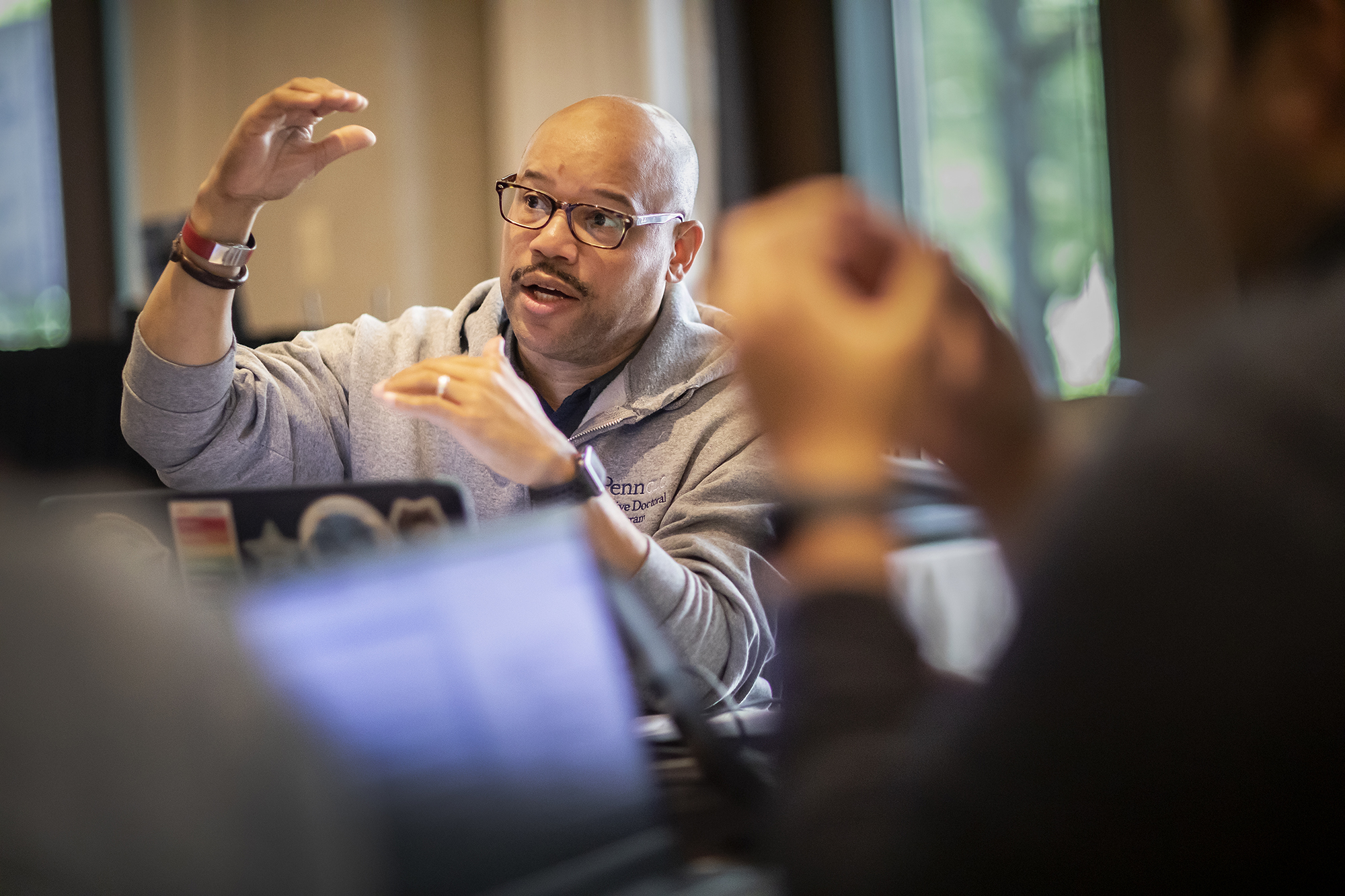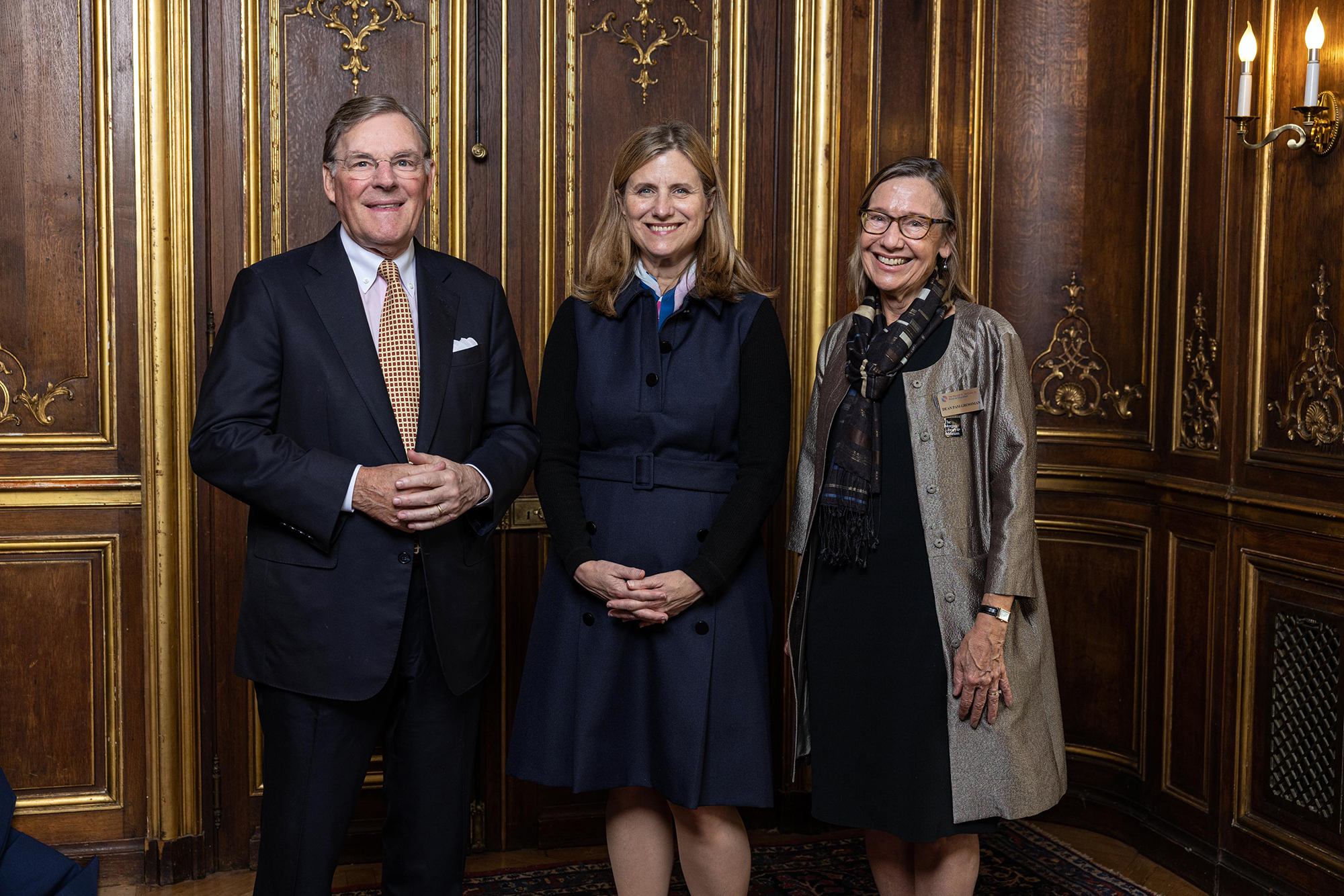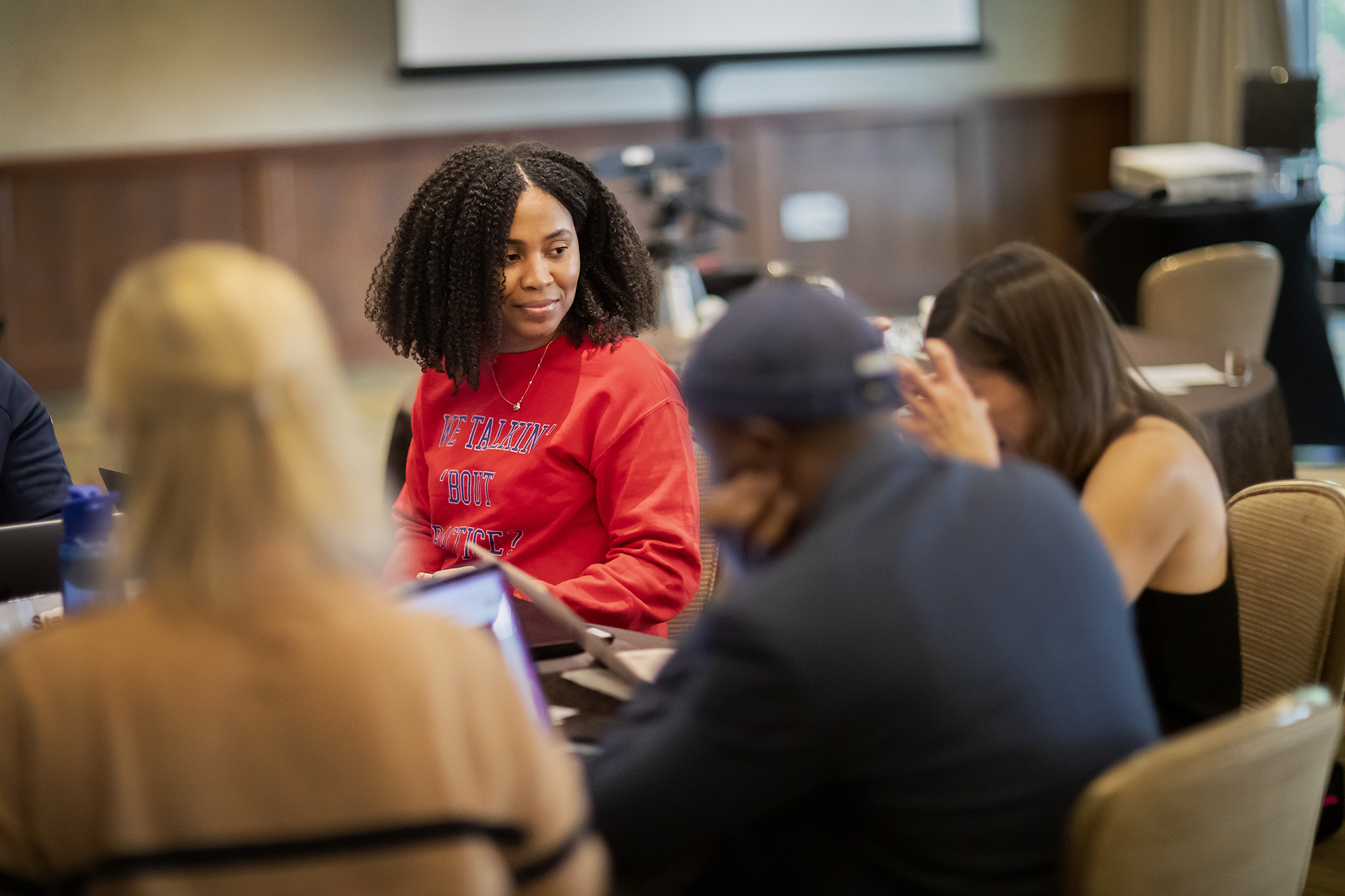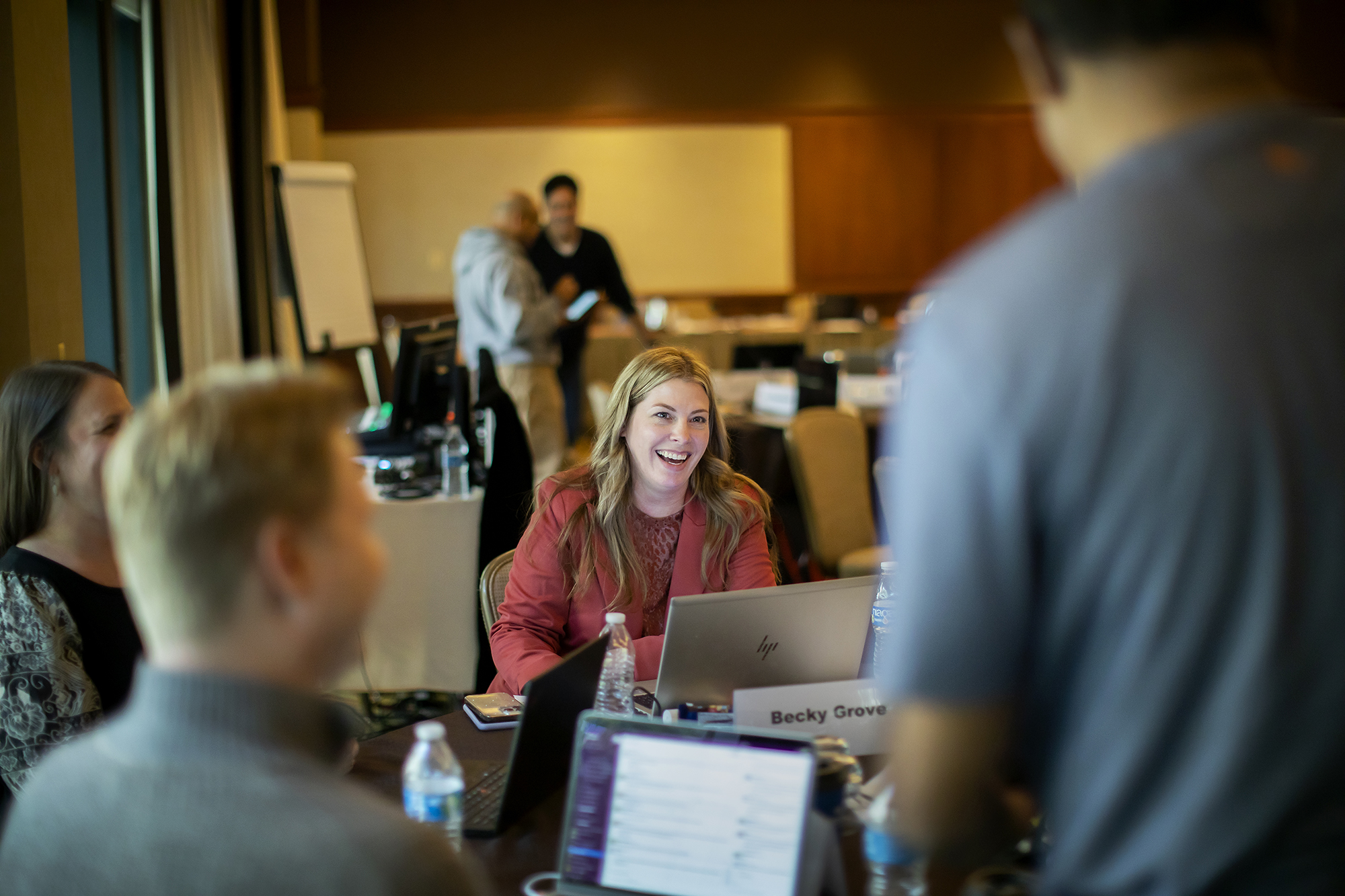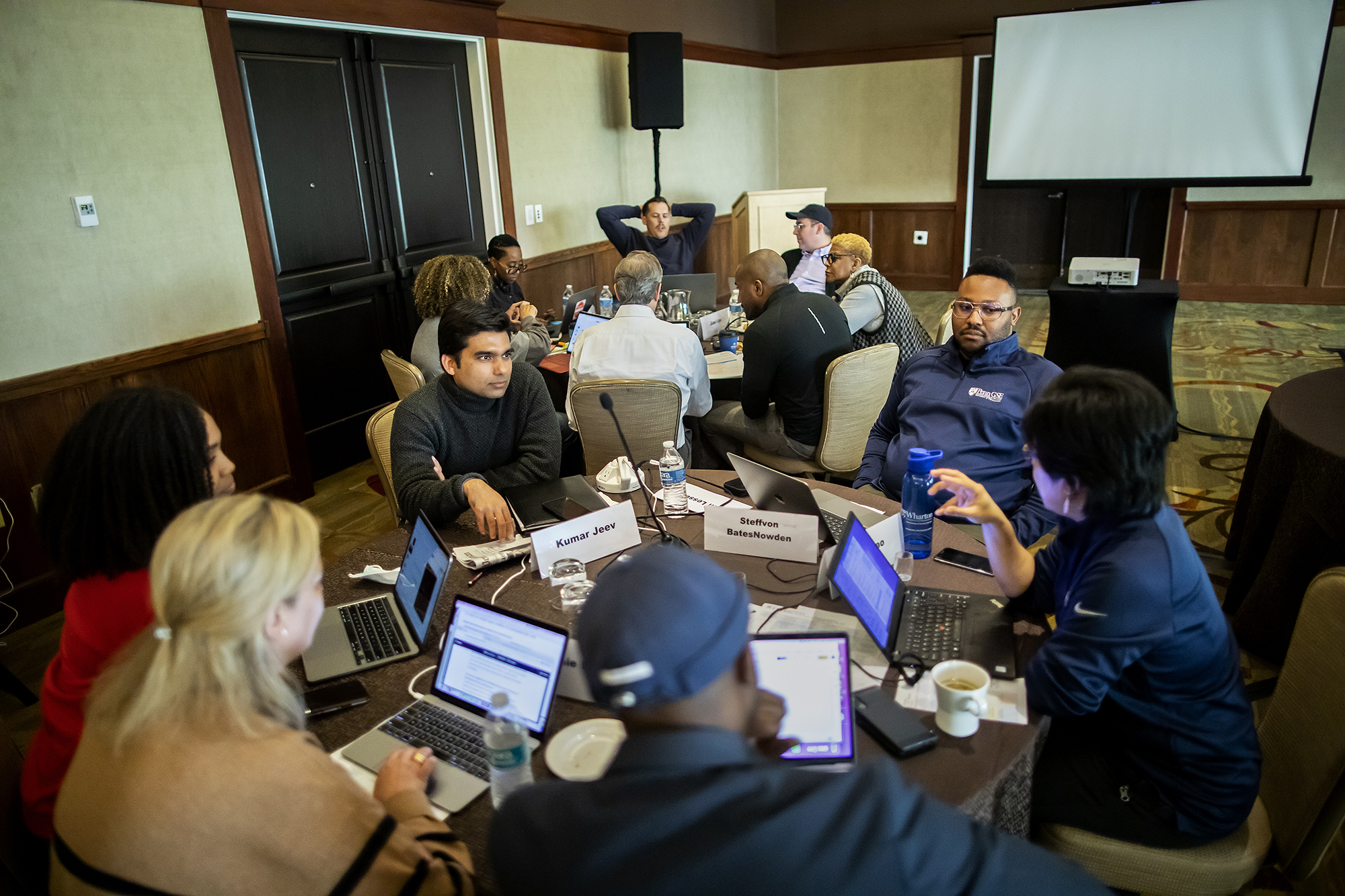
Born and raised about eight blocks from the University of Pennsylvania’s campus in West Philadelphia, John Mackey found success in the corporate world, becoming global head of diversity, equity, and inclusion for Amazon’s advertising division.
But he was looking for a way to gain the skills, network, and confidence that he needed to build a consulting business he had created. So he turned to Penn and enrolled in the Chief Learning Officer program (CLO) at the Graduate School of Education (GSE) to pursue a doctor of education (Ed.D.) degree.
“I was at a point where I needed to be even more effective. I found myself wanting some more scholarly background so I can be a better practitioner,” says Mackey, who has been in the program for 18 months. “It’s really equipped me to be a better leader.”
The CLO program offers working mid- to senior-level executives “a very different view of the world,” encouraging them to become “scholar-practitioners,” says Raghu Krishnamoorthy, director of the program since June. It is designed for “lifelong learners,” who are seeking “an opportunity to pivot personally and professionally,” and he says many of the students use the degree—and the new skills, connections, and expertise—to “take their career in a different direction.”
Krishnamoorthy is himself an example of that pivot; he graduated from the CLO program in May. He had worked at General Electric for 25 years and was the chief human resources officer when he retired from the company in 2019. Originally from India, he had been stationed in cities around the world in several roles, including as GE’s chief learning officer and as a leader in human resources at GE Aviation and GE Healthcare.
Krishnamoorthy enrolled in the CLO program as a bridge to an academic career. He had been teaching at Columbia University as a guest faculty but wanted “the proper academic credentials,” he says. He did not expect that he would become the program’s director.
“It’s a privilege to be responsible for the program where you were a student. I’ve seen both sides of the picture, and hopefully we can take the program to the next level,” Krishnamoorthy says. “We believe that workplaces around the world are filled with untapped potential. We prepare leaders who bring forth the full potential of humans for work at work.”
The CLO program, he says, is the only one like it offered in an Ivy League school of education. “We are so excited to have Krishnamoorthy leading our unique Chief Learning Officer program,” says Pam Grossman, dean of Penn GSE. “The program shares a common DNA with all of our leadership programs: an emphasis on connecting research to practical problem-solving and preparing to react and lead during a time of incredible change.”
It is one of a number of executive-format leadership programs for working professionals at GSE, including the School Leadership program, the Mid-Career Doctoral Program in Educational Leadership, and the Executive Doctorate in Higher Education Management program. Spanning public and private sectors and levels from preschool through graduate school and beyond, the programs exercise a powerful impact on education and workplace learning and preparedness.
Announced on Nov. 4, the Harold W. McGraw, Jr. Family Foundation committed $10 million to create a new McGraw Center for Educational Leadership, expected to launch in fall 2023, with a portfolio of programs, including the executive-format, to prepare leaders who can navigate change.
“We have become known for our leadership programs over the past two decades. As a school of education, we are dedicated to lifelong learning,” says Grossman, who is also the George and Diane Weiss Professor of Education, noting that more than 50 alumni of the leadership programs are currently serving as college presidents.
The CLO program attracts “a very eclectic mix of people,” Krishnamoorthy says, mid-career professionals in corporations, education, non-profits, consulting, and the military. Ages range from 20s to 60s, and most students already have earned other graduate degrees. “But everybody comes into the program with one, strong, common purpose and common interest: ‘How do I elevate the human experience in my workplace?’” he says.
On average there are about 30 students at any one time. Since its founding in 2007, the program has had more than 130 graduates. It takes between three and four years on average to graduate from the program with the doctorate. The program has more than a 90% completion rate.
The program is structured in five “blocks” of academic instruction—leadership, learning, business, evidence, and technology—that take about 18 months to complete. The schedule is designed for working professionals, meeting for two week-long blocks each semester, either virtually or in-person on Penn’s campus. The coursework includes seminars, field projects, writing assignments, and group projects. The program also builds in a master’s degree; the master’s thesis provides a steppingstone to the final dissertation, a doctoral-level research project, that results in the Ed.D. degree.
Although housed in Penn GSE, the CLO program includes instruction from professors in several Schools at Penn, including the Wharton School. “The philosophy of the University is one school, one faculty, so I can borrow and blend from business, technology, education. I’m not constrained by department. I like that cross-pollination,” says Krishnamoorthy. “No professor has turned me down so far.
“Most the students who come into this course are mid-career professionals. They don’t need to come because they need the degree,” Krishnamoorthy says. “They come into this because they want to go deep to become an expert in the space. This program is about expertise, focus, leverage, and depth.”
Starting this fall in her first academic block is Dennice Anderson, a manager at Publicis Health Media in Philadelphia. Anderson learned about the CLO program while pursuing a graduate degree in organizational development and leadership at St. Joseph’s University.
New to the program, she is also new to her job as talent program manager, employee engagement and culture. She says she wants to conduct research into the employee experience during onboarding in today’s new hybrid work environment, virtually versus in-person, and see if it impacts retention.
It’s an emerging field of research, a result of working from home since the pandemic. She says new employees who don’t come into the office are missing crucial aspects of integrating with the organization. “Onboarding impacts every part of their experience: on culture, on learning, on building connections, on mobility, and on engaging with peers,” she says.
She wants to investigate opportunities to enhance employee-engagement-related programs during her CLO studies and use the opportunity “to develop the framework, the theoretical approaches, and take that back to my work to implement,” she says. “I think having this experience with the Penn CLO program will provide me with the resources, knowledge base, and theories to support the success of those programs, especially for those who are onboarded virtually.”
A main objective of the CLO program is for the students’ dissertations to advance the thinking in their fields. “The rigor is there,” Krishnamoorthy says. “The research draws a lot of interest in the practitioner world and in the academic world. We have such a rich set of alumni and students who are making phenomenal contributions with groundbreaking work, both in terms of the research and in terms of their contribution to industry.”
Becky Grove is in her fifth academic block. She is director of learning development and organizational effectiveness at Badger Infrastructure Solutions in Indianapolis, which provides hydro-excavation services. She started the CLO program when she was at another company, looking for ways to advance in her work to support blue collar workers.
“The CLO program was really an elevation of both my career and my purpose. What drives me is how I can give back to others and help them find success and purpose in their own work,” says Grove, whose dissertation is on the effectiveness of “extended reality” training for field service workers, using augmented reality and virtual reality systems.
She says the CLO experience has changed her approach and her thinking; she is asking more and better questions, which has improved her research and analysis. She’s already taking what she is learning back to her company, with new technical training programs, organizational design, talent-management strategies, leadership programs, and strategies for diversity, equity, and inclusion.
As a leader, she is making that transition to a scholar-practitioner, Grove says. “It is giving me the skill set I need, combining research with executive presence and acumen to better influence the business. So not only do I have the data to tell the story, but I’m doing so in a compelling way to make meaningful change.”
“The involvement of the alumni is one of the core strengths of the program,” says Krishnamoorthy. Alumni speak to classes, advise on dissertations, help connect students to others in their industries. They also serve as faculty, dissertation chairs, and committee members and assist with recruiting and coaching. “We leverage the alumni in many ways,” he says.
Current students say they appreciate Krishnamoorthy’s experience in a multinational corporation and as a graduate of the CLO program.
“Raghu does know first hand what it’s like to be a student in the program, so he has a lot of empathy,” says James Timm, who is in the third academic block. “And it’s clear in this business block that he’s got a really incredible depth of context within the business world that only adds to this program. We have some really dynamic speakers and lecturers and teachers that he’s bringing to the program.”
Three years ago, Timm became the chief strategy officer and executive vice president for the Tennessee Performing Arts Center in Nashville, which is pioneering a path for the arts to make true social impact on the community it serves, he says. “I really needed to hone my skills on leadership,” Timm says, and he wanted to get a background in educational theory, which drew him to the program.
Annie McKee, former CLO program director, taught the first academic course Timm took, on leadership. “It was transformative, I would say life-changing to have taken that block with her,” he says. “I remember going home to my family afterwards and saying that I’ve been changed forever.”
Timm says the course “provided me with tools for self-analysis to understand what it means to be a leader who leads from empathy” and “the vocabulary and the frameworks to think about leadership to really make impact on an organization.”
He says he wants to research how “the arts really impact civic structure” for his dissertation. He also wants to explore how to be an “artful leader” in arts management.
“I’ve got the opportunity to get a doctorate and then start to contribute to the literature and start to be the artful leader and start to make impact on civic structure through my journey,” Timm says.
The program is designed “to draw the best faculty and the best practitioners” to offer “depth as a researcher and scholar but breadth as a practitioner,” says Krishnamoorthy. “It doesn’t only allow you to solve problems, but it allows you to really understand the problems in depth.”
Bruce Zou, from China, enrolled in the CLO program last year because he wanted to make a career change. He founded a startup, Shanghai Glocal Consulting, and is managing director. He advises multinational companies in China on manufacturing automobile-related products, including electric vehicle batteries, in the United States. Zou wants to examine how workforce development initiatives in local U.S. communities can help attract foreign direct investments by Chinese companies.
“I thought with all the experiences, networks, and partnership the program could enable me and prepare me, and with this knowledge I can better advise my clients,” says Zou, who also completed his master’s in public administration from Penn’s Fels Institute of Government in 2019. “And I have always wanted to teach later in my life. And maybe write a book at some point.”
Krishnamoorthy says CLO program participants “come out of the program having gone through a personal and professional transformation guided by world-class experts and supported by high-caliber peers.” That has been true for Mackey, even before he earns the degree.
In the fourth of the five academic blocks, Mackey decided to leave Amazon in October to focus on his own consulting company focused on diversity, equity, and inclusion and on other possible job opportunities.
“This program really helped me reconsider what I’m doing and is, frankly, giving me more courage to really step out,” he says. “It has helped me get some clarity on ‘if you’re going do this, do this.’”




